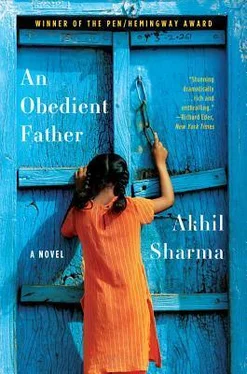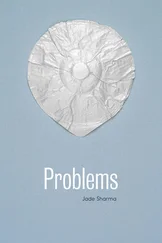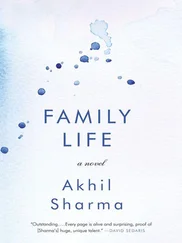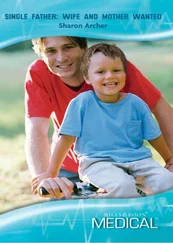Akhil Sharma - An Obedient Father
Здесь есть возможность читать онлайн «Akhil Sharma - An Obedient Father» весь текст электронной книги совершенно бесплатно (целиком полную версию без сокращений). В некоторых случаях можно слушать аудио, скачать через торрент в формате fb2 и присутствует краткое содержание. Год выпуска: 2000, Издательство: W. W. Norton & Company, Жанр: Современная проза, на английском языке. Описание произведения, (предисловие) а так же отзывы посетителей доступны на портале библиотеки ЛибКат.
- Название:An Obedient Father
- Автор:
- Издательство:W. W. Norton & Company
- Жанр:
- Год:2000
- ISBN:нет данных
- Рейтинг книги:4 / 5. Голосов: 1
-
Избранное:Добавить в избранное
- Отзывы:
-
Ваша оценка:
- 80
- 1
- 2
- 3
- 4
- 5
An Obedient Father: краткое содержание, описание и аннотация
Предлагаем к чтению аннотацию, описание, краткое содержание или предисловие (зависит от того, что написал сам автор книги «An Obedient Father»). Если вы не нашли необходимую информацию о книге — напишите в комментариях, мы постараемся отыскать её.
Ram Karan, a corrupt official in New Delhi, lives with his widowed daughter and his little granddaughter. Bumbling, sad, ironic, Ram is also a man corroded by a terrible secret. Taking the reader down into a world of feuding families and politics,
is a work of rare sensibilities that presents a character as formulated, funny, and morally ambiguous as any of Dostoevsky’s antiheroes.
An Obedient Father — читать онлайн бесплатно полную книгу (весь текст) целиком
Ниже представлен текст книги, разбитый по страницам. Система сохранения места последней прочитанной страницы, позволяет с удобством читать онлайн бесплатно книгу «An Obedient Father», без необходимости каждый раз заново искать на чём Вы остановились. Поставьте закладку, и сможете в любой момент перейти на страницу, на которой закончили чтение.
Интервал:
Закладка:
No adult minded the small violences I perpetrated. Violence was common. Grown men used to rub kerosene on a bitch's nipples and watch it bite itself to death. For a while, the men had a hobby of lashing together the tails of two cats with a cord and hanging the cats over a branch and betting on who would scratch whom to death. When the father of a friend of mine clubbed his wife's head with a piece of wood, her speech became slurred and she started having fits but not even the village women, friends of my friend's mother, found this to be an unspeakable evil. Their lives were so sorrowful that they treated what had happened to her not as a crime committed by an individual but as an impersonal misfortune like a badly set bone that warps as it heals.
All the things that might mark me as unusual and explain what I did to Anita were present in other people. I was almost always
lonely. Though I had friends, no friendship offered comfort. Walking alone through a field, I could set myself crying by imagining Ma's death. But I knew several other boys who were lonely like me, and many shared my longing.
People raised during the 1930s and early 1940s share this sentimentality. Every one of us felt as if he or she was part of a select group because we would live to see Independence. Even in our village, two kilometers from a paved road, one of the men who had nothing better to do was training us boys to manage the country by making us spend our afternoons marching up and down single file through the hills. One of my earliest memories is of my mother discussing with some women how many new sets of clothes the government would give each woman every year after Independence. Miracles were common. A man had cursed Mahatma Gandhi and had immediately fallen down dead. A few villages over, women washing their clothes in the river had seen the goddess Durga ride her tiger across the water.
When I was fifteen my father joined the Arya Samaj, a forerunner of the BJP, and sent me to an Arya Samaj school. The principal told us students to think of ourselves as being in God Ram's army. We were to live a life of simplicity, deprived, as much as possible, of the objects of vanity which might keep us from ourselves and our responsibilities. The lives of all eighty or so students were to be contained by the row of four perfectly square classrooms at the center of the school compound and, behind it, the enormous barracks-style room where we slept. Each student's bed had to be made before breakfast, and no bed could be unmade before nine at night. All personal belongings had to be kept beneath your cot or on the single small table which stood by the bed. In the back of the compound, the part farthest from the town's only road, was a series of latrines. On Sundays the students had to clean each building with ammonia.
I soon realized that all the discipline was to cover uncertainty
and I lost interest. I found what I thought was my destiny in the town's wrestUng school. I knew instinctively when an opponent's foot was unsteady, where to push and where to hold. More than this, though, I was one of those athletes who need to win and so are capable of intense concentration and surprising recklessness. By the end of the first school year, I was the best wrestler in town and one of the best in the district. Like the pious men and women who rise early each morning to sweep their local temple, I woke before sunrise to rake the dirt of the wrestling yard so that it would be smooth under my feet. I became district champion in my second year and went to the All-Punjab Tournament. I lost there, but I didn't mind, because I knew that the date for Independence was upon us and I would change with the rest of the world.
The first of the corpses was in an alley, curled on its side in the shade of a mud wall. It was late afternoon. Classes were over and I was going down a dirt path between some houses to the wrestling yard. I saw the man in the shade and thought he had passed out drunk. Alcoholism was common. He had an arm tucked under his head as a pillow and the other lay on his thigh. I walked up to him to get a better look. From a few meters away I saw a Muslim's skullcap in the dust. This surprised me, because I knew that none of the dozen or so Muslim families in the town touched alcohol. Then I understood that the darkness on the ground beside him was blood. The path was on a slope and the body was below me. The blood frightened me so much I thought the road's slope would drag me toward him. One of the man's legs stretched out of the shadow as if to trip me.
For a week after the first murdered man, Muslim corpses began appearing everywhere. At the edge of town I found a young woman and a boy of about eight lying a few feet apart next to a thorn fence. Both were naked and slashed all over. One of the blows had parted the skin and meat on the boy's shoulder and I could see white, clean bone beneath. The woman's pubic hair woke me periodically for
years, because I imagined ants feeding on her. Scattered along the side of the only road which led out of town I saw the bodies of several men and one very old woman. The corpse of the midget who ran the town's general store showed up in the back yard of an acquaintance. The yard was surrounded by a high wall, its top studded with nails and broken bottles.
That week made me think of a winter afternoon in my childhood when thousands of small, shiny, black-and-green birds suddenly appeared and settled in Beri's trees. As evening drifted in over the hills and lingered into night, the birds began dying. They fell to the ground all night long. Those birds, these corpses, felt wondrous, as if from a fairy tale.
Every Hindu in the school and town, the only people I might have had a conversation with, must have known that the murders were occurring, because we hardly discussed them. India's partition into Muslim Pakistan and Hindu India was only months away and most days the newspapers carried stories of massacres.
When we did speak of the murders, it was usually with one or at most two people. I think this was because, although the partition turned even reasonable people into fanatics, nearly all of us were horrified by the details of death, like the clean bone of the boy's shoulder. Rumors identified a few people as having taken part in the killings, a few students, a few teachers, a man who delivered milk to the school in large tin tanks, but even these people did not talk about what they had done.
Because we did not talk, the horror became intolerable. Each morning we woke with the day before us like some frightening and hopeless task. At night, we boys yelled in our dreams. There was one teacher who cried in class for two days in a row, till the principal scolded him in front of us.
Not a single member of the Muslim families survived. One Hindu lost a hand in an attack on a Muslim home.
The principal decided to shut the school and send all the students home, "in case of more violence." But we knew that he sent us
away because he did not know how else to release the pressure under which we lived.
When I returned home, my mother had pneumonia. She had been sick for several weeks and had even broken two of her ribs because of a cough which could lift her upright in a single violent exhalation.
She died one night not long after I came back to Beri. I had gone to a farm a kilometer away to buy her biscuits, which she had asked for in her fever. The sky was bright, even though the sun had set and a bit of the moon showed. In the air there was the dry, almost sweet smell of dung burning. As I walked back from the farm, I wondered whether Ma had died while I was gone. I thought this whenever I was away from her for longer than ten minutes. Ever since the week of the corpses, my mind had fixed on the idea that God was going to punish me in some way. I did not know whether he would be punishing me for seeing the corpses, or for not doing anything to help the Muslims, or because the world had passed into Kali Yug and everyone must suffer for being born in this era. I was seventeen and there was no possibility of happiness in the future. My imagination kept conjuring terrible things that might happen. I could lose my sight; my father and brothers might drink poisonous water; Ma could die.
Читать дальшеИнтервал:
Закладка:
Похожие книги на «An Obedient Father»
Представляем Вашему вниманию похожие книги на «An Obedient Father» списком для выбора. Мы отобрали схожую по названию и смыслу литературу в надежде предоставить читателям больше вариантов отыскать новые, интересные, ещё непрочитанные произведения.
Обсуждение, отзывы о книге «An Obedient Father» и просто собственные мнения читателей. Оставьте ваши комментарии, напишите, что Вы думаете о произведении, его смысле или главных героях. Укажите что конкретно понравилось, а что нет, и почему Вы так считаете.












